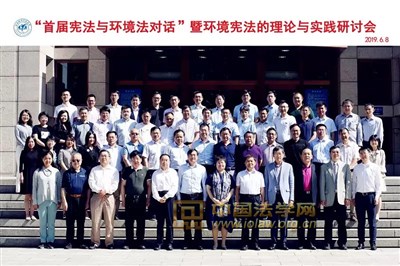“The First Dialogue Between Constitutional Law and Environmental Resource Law” and the Seminar on “Theory and Practice of Environmental Constitutional Law” were held at Beijing University of Aeronautics and Astronautics on June 8, 2019. The dialogue and seminar were sponsored by the Constitutional Law Research Committee and Environmental Law Research Committee of China Law Society, organized by the Law School of Beijing University of Aeronautics and Astronautics, co-organized by China Law Review and Guangdong Haihan Law Firm, and attended by more than 70 scholars from over 30 universities and research institutions, including Tsinghua University, Shanghai Jiaotong University, Renmin University of China, CASS, Wuhan University, Zhejiang University, Nanjing University, and China University of Political Science and Law.

The dialogue was divided into two parts. In the first part of the dialogue, the participants carried out discussions on various issues around the theme of “the incorporation of environmental civilization into the Chinese Constitution and issues relating to environmental constitution”, including the significance of the dialogue between the constitutional law and environmental law, the environmental law interpretation of the incorporation of environmental civilization into the Chinese Constitution, the understanding of the incorporation of environmental civilization into the Chinese Constitution by environmental law scholars, the understanding of “environmental civilization” from the perspective of constitutional law, whether constitutional interpretation theory can provide the constitutional basis for the protection citizens right to environmental protection and whether China needs an environmental constitution or ecological constitution.
In the second part of the dialogue, the participants discussed the following four questions under the theme of “the unfolding of ecological civilization in the constitution”: 1. The question of criteria for the determination of fundamental rights, namely what kind of right can be called fundamental constitutional rights and what challenges have been posed by environmental rights to the theory of fundamental constitutional rights? 2. Whether environmental protection, as a basic state strategy or objective, can coexist in the same constitutional text with the fundamental constitutional right to environmental protection? 3. How to understand the relationship between environmental public interest and individual to environmental right from the viewpoint of constitutional law? and 4. How to understand the justiciability of the environmental right from the perspective of constitutional law?
Professor Mo Jihong, Director of CASS Institute of International Law, took part in the discussion in the first part of the dialogue.


